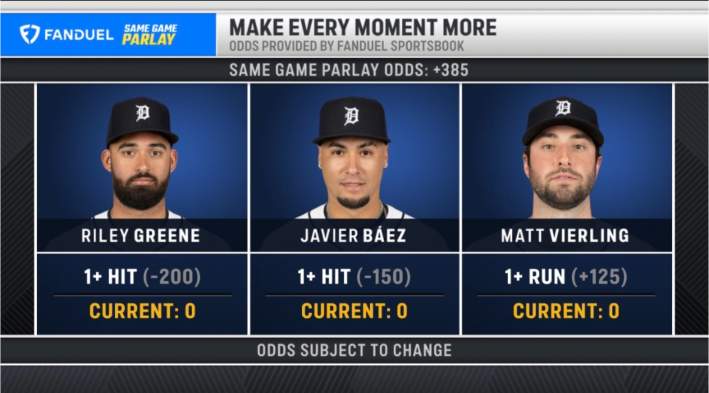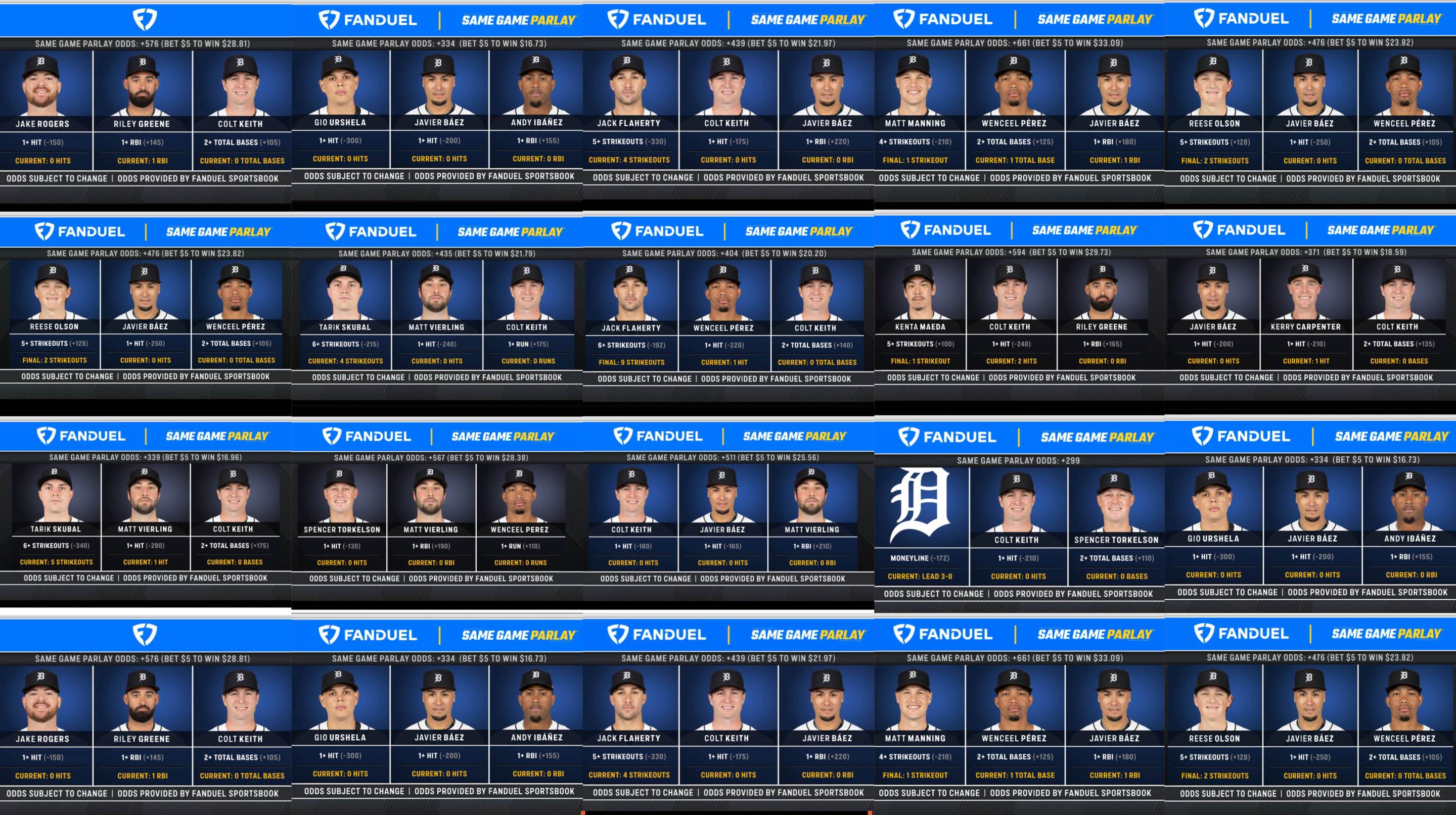We all have our shameful vices. Mine is watching every single Detroit Tigers game. In less proud moments, this finds me hankering for airplane Wi-Fi so I can track the little circles on the MLB app’s Gameday feed and fist-pump at every “In play, run(s)”—or, let’s be honest, sigh at every “In play, out(s)”—of some series against the Diamondbacks in May. But more often, I get my fix the usual way: watching the team’s games on the regional sports network Bally Sports Detroit. I could stop anytime, if I wanted to.
Sensing correctly the poor judgment of its core viewership, Bally Sports Detroit suggests during every game that I take up a new destructive habit: gambling. Baseball fans tuning into games on Bally Sports in states where sports betting is legal—or Cubs games on Marquee, Nationals and Orioles games on MASN, or Red Sox games on NESN—might notice the broadcasts promote a three-bet same-game parlay each night. Same-game parlays allow bettors to combine separate wagers on a game, each one a “leg” of the parlay, into a bigger bet that requires every leg to win for a payout. In late 2022, an executive at FanDuel, the first U.S. sportsbook to offer parlays, told investors the parlay had become the company's “dominant bet type,” driving up odds to “increase the structural margins of our business.” (That is, players lose them much more often than straight bets.) Four of five FanDuel users had placed a same-game parlay bet that year.
I resent how numb I've grown to the sports gambling ad blitz; what once felt jarring and intrusive now sort of washes over me. But in late April, about 20 games into the Tigers' season, I snapped out of my apathy and wondered if a single dumb FanDuel parlay promoted on the broadcast had ever hit. This ended the way it does when you work at a place eager to turn staffers’ late-night musings into editorial assignments: I trawled the MLB TV archive of the first half of the season (81 games broadcast on Bally Sports Detroit, from March 28 to June 30) to see whether my suspicion was correct.

The timing varies from broadcast to broadcast, but a Tigers fan is typically reminded to “make every moment more with the FanDuel same-game parlay” in the early innings of a game, often whenever the Tigers come up to bat in the third or fourth. A grim headshot triptych fills the screen, laying out the legs of the parlay, the current status of each, and the parlay's odds. The broadcast then revisits the parlay in the late innings—typically, I found, to disappointing results.
“Nothing’s hitting yet, but with the top of the order coming up, if I were a betting man, I’d feel good about my chances,” said Johnny Kane, the network’s slaphappy on-field reporter, during a parlay report in an April 6 game against Oakland. The top of the order came up, accomplished nothing, and the Tigers went on to lose, 4-0, to the A’s. None of the three legs hit.
Doing the actual math remained the focus of my project, but it was hard not to notice the broadcast team’s dwindling enthusiasm for this segment. In the early days of the season, the ever-referential Tigers play-by-play announcer Jason Benetti alluded to a joke Norm Macdonald once told on Late Night with David Letterman. Watch it at the 5:30 mark here, or read the less charming transcription:
MACDONALD: I used to gamble a lot.
LETTERMAN: You don’t gamble anymore?
MACDONALD: Don’t gamble anymore.
LETTERMAN: Was it a problem? It get to be a problem?
MACDONALD: Yeah, it got to be a problem, man. Then I tried to do it smart. Every time I try to do it smart, a bad thing would happen.
LETTERMAN: What do you mean?
MACDONALD: Well, one time I was trying to handicap baseball, you know, you can actually beat baseball if you handicap it properly? So I was trying to handicap and I figured it out for like three hours and went down to the book at Mirage, a sportsbook. I went up to the fella, you know, and there was a guy beside me, big fat guy—and he’s dressed like real rich. He opened a big attaché case filled with $10,000 chips, pulls out like $750,000, and he’s gonna bet on this boxer. Boxer, you know? A fighter, you know?
LETTERMAN: Yeah.
MACDONALD: And it was a 4-to-1 underdog! So I said, I’m not going to bet my baseball bet, I’ll just bet on this 4-to-1 underdog. 'Cause this guy must know something. He’s probably in the mafia. So I go and watch this boxing match, Dave, and the guy, my guy that I bet on, gets knocked out in 25 seconds. So I go back to the book, I go, “That guy! From the mafia! Wha—” He goes, “That guy’s not from the mafia.” He goes, “That’s ol’ Longshot Louie. He's a rich guy, loves longshots.”
LETTERMAN: Well, there’s just no winning, is there?
MACDONALD: No, there’s no winning. Nobody ever wins.
Indeed, no one was winning on April 14, when Benetti received a gloomy parlay update in a game against the Twins. “We gotta give a phone call to Longshot Louie here,” Benetti said. This turned into a running bit. “Did get a hold of Longshot Louie earlier, Jason. He feels like the over 8.5 [runs] is going to be tough to get,” Kane told him the following day, when the Tigers hosted the Rangers. (This parlay also did not hit.)
As the season went on, the FanDuel parlay updates were more often dismissed with a quick “Thanks very much, Johnny.” Benetti did crack one other joke in a May 7 game against the Guardians, asking Kane whether a same-game parlay that required four strikeouts from Kenta Maeda would still get a late-innings update; the starting pitcher had already been chased from the game with one strikeout in the third.
Tigers radio broadcaster Dan Dickerson, who does the television call when Benetti is on national broadcasting assignments, basically pretended not to hear these segments when he filled in:
The same-game parlay hits about as much as whoever’s batting seventh in the Tigers lineup most nights. I counted an 11-70 record; the winners tended to have such high odds that they weren’t enough to recoup the losses. In a late April series against the Royals, the broadcast ended its 18-game parlay losing streak with back-to-back wins, one $10 bet to win $20.20 and another to win $14.60. A hypothetical fan who made every moment more for the first 81 Bally Sports Detroit games of the season, $10 per bet, would have also made their wallet $383 lighter.
Elsewhere around MLB, there are other strategies. The same-game parlays are designed by each local broadcast’s producers, and not by FanDuel, so the segment’s presentation can vary wildly. Watching a Red Sox-Reds game a few weeks ago, I simply had to tip my cap to an amazing Bally Sports Ohio parlay that would at least dig fans out of the season’s debt if it hit. The same-game parlay comprised: the game under 9 runs; an Elly De La Cruz home run; and a Ceddanne Rafaela RBI, at +5060, odds that the cowards at Bally Sports Detroit could only dream of. (This parlay didn't hit.)
While most broadcast copy includes the payout for a bet of $5 or $10, some broadcasts encourage fans to set their ambitions higher. The MASN pregame show for a Yankees-Orioles game in late April suggested a unit for that night’s BetMGM same-game parlay, one involving Adley Rutschman total bases, Juan Soto total bases, and a Ryan O’Hearn RBI: “$100 BET PAYS $875.” Does it need to be said that the parlay didn't hit?
These broadcast integrations end up making rather poor advertisements for gambling. At worst, they’re undercut by the person doing the ad read: “Colt Keith needs a hit, Javy needs a hit, Vierling needs an RBI. Who comes up with these things, you know? Maybe we should have [as] part of the prop bet Jack Flaherty strikeouts. But I just read what I’m told,” said Kane, providing an 0-fer update during an excellent Jack Flaherty start on May 30 against the Red Sox. At best, they sit awkwardly on the screen, an annoyance the TV booth wants to ignore. The broadcaster, the bettor, the Tigers fan—nobody ever wins.






